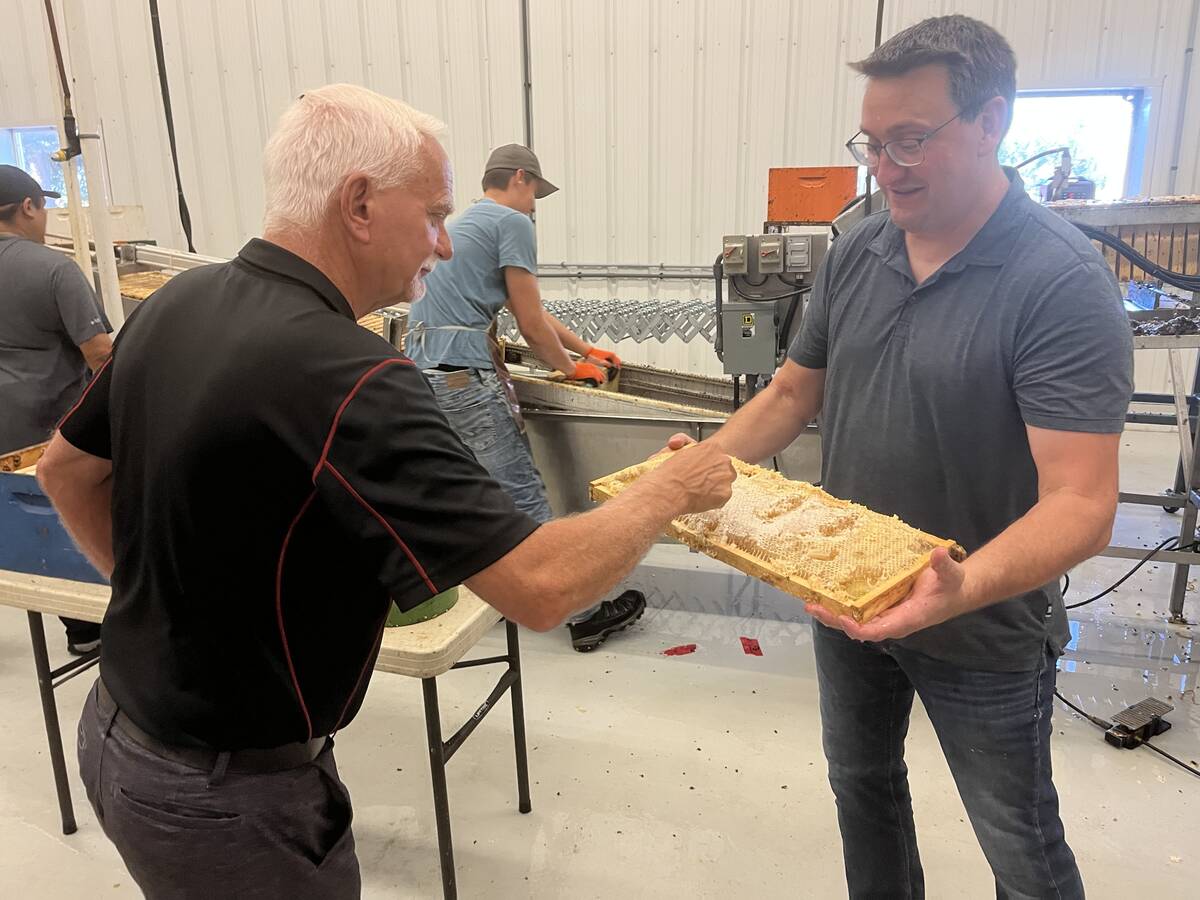PEACHLAND, B.C. – Tilman Hainle and Sara Norman are connoisseurs of fine wine, good food and sustainable agriculture.
Through their Working Horse Winery and Vineyards, the couple plans to produce about 30,000 litres a year of ice wine and other vintages made from heritage variety grapes as well as Pinot noir, Meunier and Chardonnay.
Even though Norman is a trained chef and Hainle is an internationally respected vintner trained in Germany, the pair insists they are farmers first.
Hainle and his father made the first ice wine in North America in 1978, so the farm plan includes an ice wine historical centre and a learning centre for chefs, wine professionals, environmentalists, architects and others interested in organic wine and food, sustainable development and eco-communities.
Read Also

Alberta honey business ‘thrives’ despite bumpy beginnings
Thrive Honey showcases its honey production in market where Alberta produces 40 per cent of all honey produced in the country
A vegetable patch adds to the ambience using heritage varieties that Norman can incorporate into personally designed menus to match the wines. These menus will be prepared for small groups by appointment.
“Much of what we do embraces that concept of doing many things, not just monoculture but grapes integrated with other commercial crops like vegetables that we are growing on site here,” Hainle said.
The 22-acre farm on the edge of Peachland is part of a larger 90-year-old homestead owned by a farmer who died without heirs in the 1930s.
The Hainle family bought the farm in 1972 and Tilman and his father started planting vines in 1974. Part of the farm includes pasture, gardens and forest.
It is a modern operation, but the family added Suffolk draft horses last year. Suffolks are a rare breed and are suited to work the sloping land with less disturbance to the sandy soil.
“We try to emphasize that organic growing techniques are very gentle on the neighbour-hood,” Hainle said.
“Using the draft horses is a very novel thing and that certainly is a lot less noisy and intrusive than a tractor would be.”
One project includes ripping out an old section of vines that have become gnarled and unproductive with age. The roots can grow as thick as a man’s wrist and are deep because the vines aren’t irrigated.
The farm achieved organic certification in 1993. In 1992, Hainle established standards for independently certified organic winemaking in Canada.
The property is isolated on three sides so the operation is in no danger of sprays drifting in from other farms. Another organic farm is nearby but most of their neighbours are Peachland suburbanites.
“They (certifiers) came up here, they thought they were in heaven because they realized we have natural growing buffers on all sides,” Hainle said.
The farm is not within the province’s Agriculture Land Reserve but does have a legal covenant to protect it.
“That gives us some freedom on the land. Subdividing it for houses and condos is the last thing we want to do.”
They use their own grapes to make wine, but they may sign a long-term contract with another organic grower in the southern part of the valley.
The grape growing climate varies from north to south, making different varieties available. For example, Pinot noirs growing in the middle of the valley require less heat than merlot and cabernet, which also require a longer growing season.
Harvest starts in September and continues into mid-October. They do most of the work themselves with some local help.
Most growers collect their grapes and assess the juice chemically, but Hainle prefers a more hands-on approach.
“I like to walk the vineyards and see what shape the grapes are in, is the vine still growing, does it have green leaves?”
“My rule is to pick a berry, pop it in the bag and pick the next berry and pop it in my mouth. From that taste you can tell a lot. You can’t tell strictly from the chemical analysis.”
Hainle has created a white blend ice wine using heritage varieties that he does not reveal. The wine is sold on the farm, through the internet and to local restaurants and liquor stores.
The farm is the only Canadian winery to use glass stoppers.
Ice wine harvest requires temperatures of -8 C and in some winters picking does not start until February. Since 1978, there were only three years where the weather was not cold enough.
Last year they picked grapes at – 20 C because the weather was unusually cold but they were able to pick during the day in the sunlight rather than at night using lights. They had to warm the grapes to -12 C so they could be pressed.
When the berries freeze, a mixture of ice crystals and concentrated juice is created. The more concentrated the juice, the higher the sugar content, which needs to be a minimum of 35 percent. The juice does not freeze because it has a natural antifreeze.
“Lower is better so -10 or 12 is my preferred temperature so I have 45 percent sugar,” Hainle said.
The couple likes to remind visitors about the importance of farmers in a community. They are members of local and provincial groups promoting farmgate sales, locally produced food and consumer education.
Norman said it all comes down to market fairness.
“We are willing to pay $15 for a pound of coffee but if somebody said to you, are you willing to pay $15 for a lb. of the best tasting tomatoes you ever had, they would say, ‘well, no,'” she said.
“Farmers deserve to be fairly paid for their food.”

















